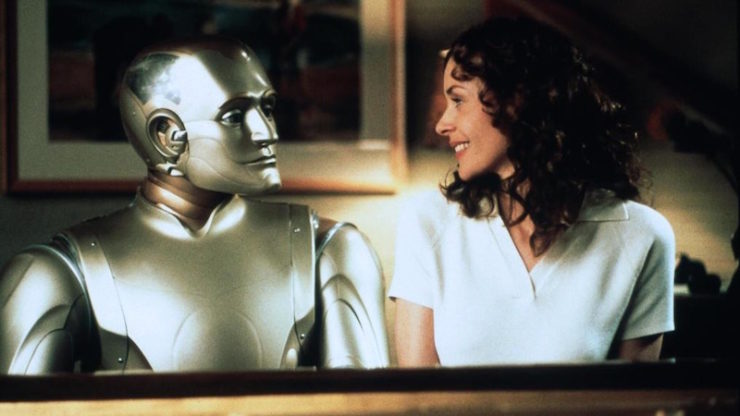I adore robot love stories because I adore robots. As characters, I mean—I’d probably be terrible with robots as they exist in our society now. Robots are an incredible filter for questions about humanity, what we value and what we are seeking as we push the boundaries of art and science. But when a human falls in love with a robot, or even engages with intimacy of any form with the human, there is a question posed by the very nature of their relationship:
Is consent possible?
And when we use the term consent in this context, we must address it both broadly and minutely. Can the robot consent to a relationship at all? Are they likely to based on their programming? Can they consent to any form of intimacy? Are they created to do so? Can they be taken advantage of either emotionally or physically? Can they take advantage of others? Is the person who wants to enter into a relationship with the robot considering these issues at all? Is the robot?
If we consider the fact that all robots raise the issue of consent, we have to ask what these stories mean to examine about the topic. Not every storyteller may intend to have this conversation using their characters, but it’s impossible to avoid the concept when robot characters are (more often than not) created and programmed by people. There is a natural power imbalance—whether romantically inclined or not—in many robot/human relationships, and addressing those power imbalances ultimately tells us something about the power dynamics of our own world, whether it’s through the the lens of a gigolo mecha named Joe in A.I.: Artificial Intelligence, or the long-standing marriage of a freed android named Andrew and his human wife Portia in Bicentennial Man.
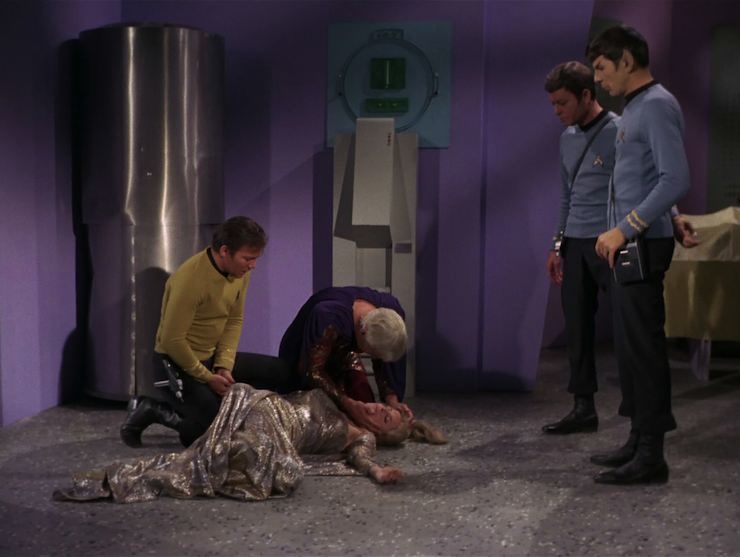
Star Trek has a corner office on this particular narrative, with one-off episodes and central characters who all scrape at this conceit. In the Original series, both “What Are Little Girls Made Of?” and “Requiem for Methuselah” address the concept of robots who can fall in love with people, and whether or not human beings should be making robots that can form this manner of emotional attachment at all. In “Methuselah”, Kirk falls in love with a woman he doesn’t realize is an android—and neither does she. Raina is a lifelike robot created by an immortal man going by the name of Flint. Thinking that Raina could be his permanent romantic companion, Flint waits for her emotions to emerge. But they don’t until Raina meets Captain Kirk, and the fight between the two men for her affections ends up killing her. Flint cares nothing about Raina’s consent whatsoever, not in creating her, not in throwing her at Kirk once he realizes that the man’s presence is cultivating the emotions he has been seeking, not in asking her what she wants once those emotions exist. It is down to Raina to tell him that she has the power and ability to make her own choices—
—but even that’s a myth, as the love she feels for Kirk combined with the loyalty she feels to Flint scrambles her circuitry and ends her life. The fact that Flint created Raina to be his prevents her from being able to achieve her own autonomy and make her own decisions. Her creation as property rather than life makes it impossible for her to consent to anything that Flint isn’t looking for.
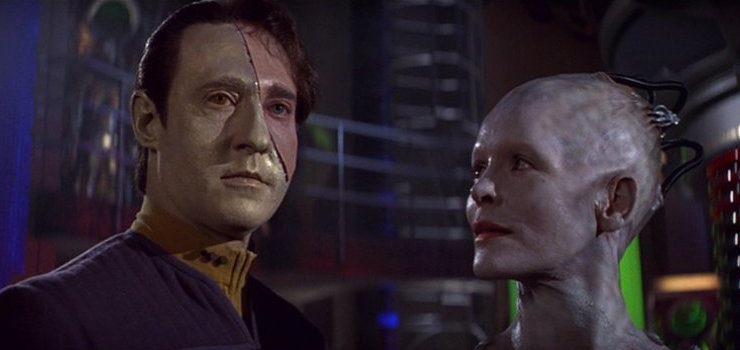
This is even more discomfiting in the sexual encounter that Data has with the Borg queen during Star Trek: First Contact (made more interesting by the fact that the Borg themselves are not completely organic beings). When the queen suggests that they sleep together, she is holding Data captive; should he want to refuse, he is in no position to do so. What’s more, there’s every chance that Data goes along with tryst to gain her trust, which he later exploits to great effect. Though the film doesn’t linger on the android’s reasoning or motives, it’s likely that he pretended to enjoy a sexual encounter he didn’t want to have for the sake of his crew and their mission to stop the Borg. It’s important to note that the Borg queen forcibly activates Data’s emotion chip during his capture, putting him in a deliberate state of emotional vulnerability that he is incapable of shielding himself from. The queen has made a pattern of this; we’re led to believe that she treated Captain Picard much the same when he was assimilated by her people, creating a twist on the usual narrative—a cyborg who forces their will onto organic and inorganic beings alike, and even changes their physical bodies without their consent.
Cassandra Rose Clarke’s The Mad Scientist’s Daughter looks at consent through the lens of repression and subjugation. Cat is raised with a robot tutor named Finn, who is also her father’s assistant. When she grows up, she has an affair with Finn, but doesn’t believe this has much of an effect on him because her father had always told her that the robot had no emotions. As she’s working her way through a terrible marriage, her father makes a confession; Finn does have emotions, he just has programming that represses them. Her father finally gives Finn his autonomy and has creates new programming that will allow Finn to fully experience his emotions—but once that programming is implemented, Finn takes a job on the moon to escape the realization that he’s in love with Cat. Finn’s ability to consent is ignored or misunderstood by everyone around him, and when he is finally given the ability to express himself, he’s already been through so much that he runs away. Eventually, he and Cat work things out and they decide to embark on a relationship together, but a great deal of trauma results from no one caring about his ability to say yes or no.

There are shades of severity in all of these stories, and sometimes the outlook is horrific in the extreme. Both Westworld and Do Androids Dream of Electric Sheep? create visions of the future in which robots must submit to intimate acts with humans because they have been created to do so, or because it is beneficial to their survival. In the former (both the film and the current television series), the robots are created for the purpose of human entertainment, though emerging sentience among them makes their ability to consent a paramount issue. Electric Sheep contains a segment where Pris makes it clear that the Andie model has taken to seducing bounty hunters in an effort to promote empathy and prevent their own murder. In the film version, Blade Runner, Decker forces a kiss on Rachael and the power dynamic of that moment could not be more clear—he is a Blade Runner, she has just learned that she’s a replicant. His job is to kill beings like her, and his aggression in that moment is a danger to her. The fact that this ultimately leads to a relationship between the two characters is a deeply disturbing turn of events; from this extreme power imbalance, a romance blooms. (Mind you, this is true whether Deckard is secretly a replicant himself or not.)
Ex Machina also focuses on a burgeoning relationship between a robot and a human. Bluebook CEO Nathan brings his employee Caleb into his home to perform the Turing Test on Ava, an AI of his own design. As they talk, it seems as though Ava might be attracted to Caleb, and Nathan encourages this, making it clear that he gave her the ability to feel sexual pleasure. Caleb later learns that Nathan regularly has sex with his servant robot Kyoko, and that he may have also had sex with earlier versions of Ava, despite the fact that these incarnations showed a clear and vocal desire to escape him. Caleb helps Ava escape, giving her the window she needs to kill Nathan with Kyoko’s help, but fails to anticipate the truth—that Ava feels nothing for him, and was using him to break out of this prison. She leaves him locked in Nathan’s house and achieves her freedom, having used Nathan’s test against them both. She flips the power of her encounters with them entirely, and achieves her autonomy on her own terms, having been denied it by her creator.
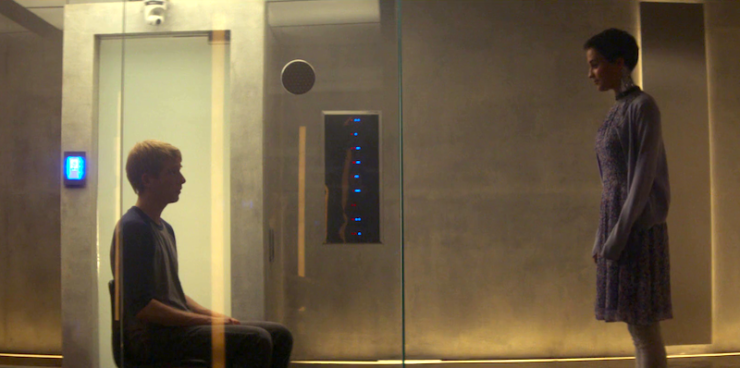
Annalee Newitz’s Autonomous envisions a future ruled by Big Pharma, in which agents of the International Property Coalition protect patents and hunt down pharmaceutical pirates. Paladin, a military grade robot belonging to the IPC, is assigned a human partner, Eliasz. Initially, Eliasz assumes Paladin is male, but later—after learning that the human brain Paladin possesses belonged to a human female—asks if she would prefer female pronouns. Paladin agrees, and from that point on, Eliasz considers his partner to be female, without ever learning that robots like Paladin are not really any particular gender—the human brain in Paladin has no bearing on the robot’s person. As the two agents grow closer, their dynamic is complicated; Eliasz is deeply uncomfortable with the thought of being gay due to his background and upbringing, while Paladin’s friend Fang warns that Eliasz is anthropomorphizing her. Paladin ultimately doesn’t mind because she cares for Eliasz, but the real problem hanging between them her is a lack of autonomy. She is owned by people, and the organization she serves is permitted to access her memories whenever they wish. Her consent is unimportant to the humans who essentially use her as slave labor.
By the end of the story, Paladin’s human brain component is destroyed and Eliasz purchases Paladin’s autonomy, asking if she would be willing to go with him to Mars. Before she answers, Paladin is able to encrypt her own memories to herself for the first time in her existence. She is then able to make her very first autonomous choice, and agrees to go with him. But Paladin is aware that Elias has likely anthropomorphized her, and perhaps aligned her with a transgender human after the switch in pronouns that she agreed to. She is uncertain if Eliasz understands that these human terms don’t have any bearing on her:
Maybe he would never understand that his human categories—faggot, female, transgender—didn’t apply to bots. Or maybe he did understand. After all, he still loved her, even though her brain was gone.
Because she could, Paladin kept her ideas about this to herself. They were the first private thoughts she’d ever had.
In the first moments that Paladin has the true ability to consent, she elects to keep her thoughts to herself, and elects to stay with Eliasz. This perfectly illustrates the concept of autonomy and consent within a relationship; no one has the ability to share their every thought with the people they care about, and there will always be things that your partner doesn’t know. Moreover, Eliasz doesn’t presume that Paladin has to go with him because he bought her freedom. Though we cannot know how he would have reacted if Paladin had rejected his offer, he still asks her to join him rather than assuming that she will want to. He doesn’t understand the nature of her personhood, her lack of gender as humans perceive it, but he doesn’t demand that Paladin acquiesce to his wishes.
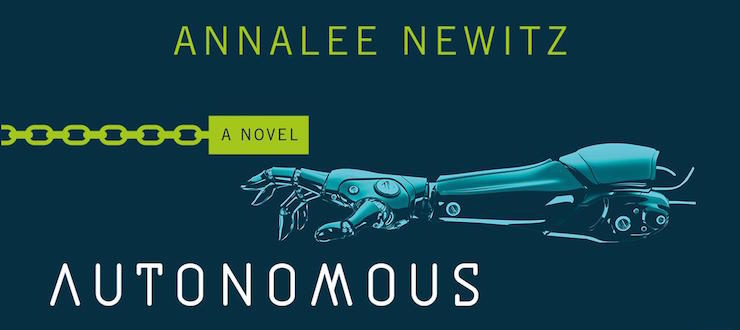
What kind of picture does this paint? When we look back through the myriad of fictional robot/human relationships, it’s hard not to notice a pattern of ignorance in our human cyphers. We are aware of the fact that so many people do not consider the consent of others in the world we occupy, that they do not take anyone else’s comfort into account. This is part of the reason that these stories are rife with abuses of power, with experimentation that leads to pain or fear or far worse. While robot romances do explore our boundless capacity to love, they also prove that we have an equally boundless capacity for cruelty. Too often, the humans who want robots to love them or please them never consider the most basic questions of all: Do you want this? Does this hurt you? Do I have all the power here? Do you care for me, too?
Whether we notice it or not, these are the questions that robot love stories and affairs are always asking us. They command that we engage with our own beliefs about what we deserve in love—or in any relationship at all. The tenets of respect and consent are important throughout our lives, in every interaction we undertake. Our ability to tell people how we feel, what we need, where our boundaries are, are still subjects that we struggle with. When we engage with these stories, we are actively questioning how to navigate those delicate lines when we’re face to face.
Emmet Asher-Perrin cannot stop thinking about robots ever so do not ask her to. You can bug her on Twitter and Tumblr, and read more of her work here and elsewhere.










